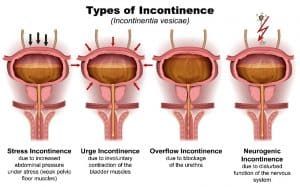Fecal & Urinary Incontinence Treatment Reno, NV
Incontinence Treatment in Reno
 Bladder leakage, Overactive Bladder, and Bowel leakage can occur at any age, but both happen more often as we get older. Overactive bladder is the frequent and often sudden urge to urinate, which can be difficult to control. The medical term “Incontinence” is the involuntary release of stool or urine, no matter what the cause. These conditions are significantly more common than most realize, affecting tens of millions of Americans. Please know you are not alone, and there is something which can be done to help.
Bladder leakage, Overactive Bladder, and Bowel leakage can occur at any age, but both happen more often as we get older. Overactive bladder is the frequent and often sudden urge to urinate, which can be difficult to control. The medical term “Incontinence” is the involuntary release of stool or urine, no matter what the cause. These conditions are significantly more common than most realize, affecting tens of millions of Americans. Please know you are not alone, and there is something which can be done to help.
People who experience bladder leakage, overactive bladder, or bowel leakage are often embarrassed by the lack of control they have over their bowels and bladder. The good news is incontinence is a diagnosable problem that can be successfully treated.
Dr. Kent Sasse is proud to have helped hundreds of people in Nevada to overcome their incontinence and restore normal bowel and bladder control.
Types of Incontinence
 Fecal incontinence occurs when a person cannot control his or her bowels. As a result, stool leaks from the anus. It can be caused by chronic diseases, cancer radiation, prostate surgery, neurological conditions, or spine surgery, which leads to damage of the communication system between the nerves and the muscles of the pelvic floor.
Fecal incontinence occurs when a person cannot control his or her bowels. As a result, stool leaks from the anus. It can be caused by chronic diseases, cancer radiation, prostate surgery, neurological conditions, or spine surgery, which leads to damage of the communication system between the nerves and the muscles of the pelvic floor.
People with urinary incontinence experience poor bladder control and bladder leakage. Some notice that they leak urine when they cough, laugh, sneeze or exercise, often called stress incontinence. For others, the leakage occurs after bladder spasms or an urgent need to urinate, often called urge incontinence. It often progresses to the point where a person is spending a lot of money on liners, pads and diapers.
Although incontinence is not an inevitable part of aging, it is more common among older individuals. While women have higher rates of incontinence than men, all genders are affected by the condition. Women are especially prone to incontinence after pregnancy, vaginal childbirth and menopause.
Treatments
Pelvic floor exercise therapy
Dr. Sasse employs a highly sophisticated, scientifically based pelvic floor exercise regimen to treat many patients who have fecal or urinary incontinence. Training and rehabilitating the pelvic floor musculature is a helpful component to any therapy that restores normal bladder and bowel control.
Sacral nerve modulation
Dr. Sasse uses sacral nerve modulation (SNM) to treat many patients who have fecal or urinary incontinence. Long-term, peer-reviewed studies have found that 90%+ of patients report a successful result with this therapy.
Sacral nerve modulation involves inserting a small implant under the skin that sends slight electrical pulses to the pelvic floor. Like a pacemaker, the tiny device sends signals to restore the control of the bowels and bladder, in many cases completely solving episodes of incontinence.
This therapy is an FDA-approved, simple outpatient therapy that is appropriate for all individuals who have not found enduring success from Kegel exercises and medications, and SNM exhibits higher and more durable success than Botox injections or tibial nerve stimulations.
The standard protocol is to have a 20-minute test procedure and placement of a trial implant of the device to determine whether it works effectively on your body before implanting it permanently. During this test phase, Dr. Sasse can understand completely if the device will result in a significant improvement or complete resolution of bladder leakage, bowel leakage, or overactive bladder.
Solesta
Individuals with fecal incontinence or stool leakage, may also be good candidates for Solesta, a tissue bulking agent. Dr. Sasse uses a needle to inject the Solesta polymer into the tissues around the anorectal sphincter. Oddly enough, this sphincter does not have any feeling, so while this sounds scary, patients don’t feel anything and the whole procedure takes less than 20 minutes. The Solesta polymer adds bulk to the sphincter, which helps to physically allow more control over the bowels. The results from a single Solesta injection can last for over two years. It can be combined with other treatments (sacral nerve modulation, pelvic floor exercises, etc.) to reduce the incidence of fecal incontinence.
Axonics® Therapy is an effective solution for treating symptoms of:



Cost of Incontinence Treatments
Medicare and nearly all health insurance plans cover sacral neuromodulation, Solesta, and other treatments related to fecal and urinary incontinence. Dr. Sasse’s staff is happy to help you review your plan to ensure that your treatment is a covered benefit.
Why You Should Choose Dr. Sasse
Dr. Sasse completed a Fellowship at the prestigious Lahey Clinic, in Massachusetts, choosing to devote his research efforts to pelvic floor disorders and incontinence. Dr. Sasse spent his entire laboratory time during fellowship under the leadership of Dr. John Coller, studying patients who experienced this maddening issue of both fecal and urinary incontinence. Dr. Sasse published a peer-reviewed research paper stemming from this research.
It was that research early in his career along with the advent of the latest sacral nerve technology which led to the founding of The Continence Center here in Northern Nevada. Dr. Sasse is proud of having provided highly successful solutions to so many people. So many patients at The Continence Center, like millions of people elsewhere, have been suffering in silence after trying other unsuccessful modalities.
Patients of The Continence Center are overwhelmingly thrilled with the results attained through Dr. Sasse’s multimodal approach, with sacral nerve modulation as its cornerstone therapy. They like that the procedure is simple, painless, fast and minimally invasive and that they experience a dramatic decrease in bladder or bowel accidents. It’s common for Dr. Sasse to get a huge thank you from a patient who might say something like “you’ve changed my life and I can’t tell you how grateful I am.”
Rather than resigning yourself to having bladder leakage, overactive bladder, accidents, or bowel incontinence for the rest of your life, schedule a consultation with Dr. Sasse by calling (775) 210-8869. He will determine the proper course of treatment so that you can regain the control you deserve to live life on your terms.

